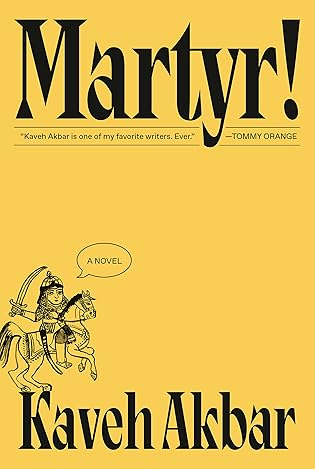 Martyr! by Kaveh Akbar
Martyr! by Kaveh Akbar Published by Vintage on January 23, 2024
Genres: Contemporary Fiction
Pages: 352
Format: E-Book, eBook
Source: Library
Buy on Amazon, Buy on Bookshop
This post contains affiliate links you can use to purchase the book. If you buy the book using that link, I will receive a small commission from the sale.
Goodreads
Kaveh Akbar’s Martyr! is a paean to how we spend our lives seeking meaning—in faith, art, ourselves, others—in which a newly sober, orphaned son of Iranian immigrants, guided by the voices of artists, poets, and kings, embarks on a search that leads him to a terminally ill painter living out her final days in the Brooklyn Museum.
Cyrus Shams is a young man grappling with an inheritance of violence and loss: his mother’s plane was shot down over the skies of Tehran in a senseless accident; and his father’s life in America was circumscribed by his work killing chickens at a factory farm in the Midwest. Cyrus is a drunk, an addict, and a poet, whose obsession with martyrs leads him to examine the mysteries of his past—toward an uncle who rode through Iranian battlefields dressed as the Angel of death to inspire and comfort the dying, and toward his mother, through a painting discovered in a Brooklyn art gallery that suggests she may not have been who or what she seemed.
Electrifying, funny, wholly original, and profound, Martyr! heralds the arrival of a blazing and essential new voice in contemporary fiction.
Martyr! is probably one of those books I’m going to think about for a long time. I appreciated how complex and real the characters were. There are some moments of exquisite writing, which is no surprise given Akbar’s background as a poet.
Cyrus wants his death to mean something, so he researches martyrs.
If the mortal sin of the suicide is greed, to hoard stillness and calm for yourself while dispersing your riotous internal pain among all those who survive you, then the mortal sin of the martyr must be pride, the vanity, the hubris to believe not only that your death could mean more than your living, but that your death could mean more than death itself—which, because it is inevitable, means nothing.